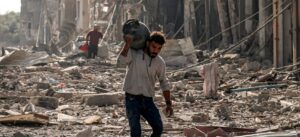With armed Houthi rebels prowling the Red Sea, attacking cargo ships and holding crew at gunpoint, America and its allies appear to be preparing for war. When asked about potential strikes in Yemen earlier this week, the UK Defence Secretary, Grant Shapps, said: “Watch this space.” Last night, any uncertainty about what this might mean evaporated as the US and UK launched military strikes in Yemen.
Today, as the dust settles, the global community cannot afford to let this threat escalate. The Houthi attacks, combined with the worsening Israel-Iran confrontation, have raised oil prices and forced 20% of the world’s container ships to avoid the Red Sea — instead taking the far longer route around the southern tip of Africa. Increased insurance rates and freight charges will soon be passed on to consumers. There is a clear need for international action to restore freedom of navigation — yet the West finds itself with few good options.
But before we go to war with the Houthis, or launch further strikes, it is probably a good idea to understand exactly who they are. “Houthi” is a derogatory name for Yemen’s Ansar Allah or Supporters of God movement, which was founded in the Nineties by Hussein al-Houthi and, since his death in 2004, led by his brother, Abdul Malik al-Houthi. Hussein was a gifted orator whose message found many listeners in Yemen’s neglected and impoverished northern Sa’dah province, where most inhabitants belong to the Zaydi branch of Shia Islam. The Houthi brothers called for a Zaydi religious revival, opposition to Yemen’s central government, and hatred of Israel. Their signature chant remains “Death to America, Death to Israel, Curse the Jews, God is Great”.
In 2011, when Arab Spring protests brought Yemen’s government down, the Houthis seized control of Sa’dah province. Then, in 2014, they joined forces with the deposed dictator Ali Abdullah Saleh to overthrow the internationally recognised transition government of Abdu Rabbu Hadi. With Saleh’s help, they advanced from their homeland in the north all the way to Aden in southern Yemen in just two months. Then the Houthis turned on Saleh and killed him. The United Nations condemned the Houthi’s coup and human rights violations, while also authorising the inspection of vessels bound for Yemen in order to confiscate weapons.
Today, the Houthis nominally control most of Yemen, where they have imposed a vicious police state — although much of the country is in fact ruled by local tribes and war lords. The multinational naval blockade has caused great suffering in a nation that imports most of its food, fuel and medicine, and rampant corruption in Houthi-controlled ports has made delivering foreign assistance difficult. Thousands of Yemenis have died from fighting, disease and malnutrition; millions have been made homeless and unemployed. The Yemeni people are not looking for another war.
Iran did not create the Houthis but, recognising them as fellow Shia Muslims, it has long provided the movement with funds, arms, training and advice. And for more than a decade, Iran has aggressively used the Houthis — along with other paramilitary proxy militias, including Hamas in Gaza and Hezbollah in Lebanon — as a vehicle to expand its influence in the Arabian Peninsula and undermine its traditional rival Saudi Arabia.
Yet Washington also bears some responsibility for today’s Houthi crisis due to its failure to maintain its longstanding security partnership with Saudi Arabia. In 2015, the Saudis tried to prevent the Houthi takeover of Yemen. They had numerous reasons for doing so: they wanted to limit the smuggling of weapons, drugs and people across their southern border; they did not want al-Qaeda terrorists fleeing from Saudi Arabia to find a haven in Yemen; and they did not share the Houthi’s view that much of southern Saudi Arabia should belong to Yemen. Above all, the Saudis did not want Iran to expand its influence in Yemen.
The Saudi effort was largely confined to an air campaign which at various times relied on American weapons, refuelling and intelligence. Like all bombing campaigns, this resulted in civilian casualties — remember that more French civilians died on D-Day as a result of the pre-invasion allied bombardment than allied troops died on the Normandy beaches. While it seems unlikely that the Saudis spent expensive munitions deliberately targeting school buses, such incidents prompted harsh criticism of Riyadh, the termination of some US military assistance, and eventually the effective end to their campaign.
Washington’s tepid support for the Saudi-led coalition against the Houthis caused the Saudis to doubt the credibility of US security commitments, especially when threats to cut off arms sales became almost routine. And American hesitancy to supply the Saudis with drone technology forced them to turn to Italy and China. When the Biden administration removed the Houthis from the list of designated terrorist groups and withdrew Patriot air defence systems from Saudi Arabia, the Saudis had even more reason to doubt America.
The Saudis soon found themselves in a difficult situation, wishing to devote financial resources to economic development rather than an endless war in Yemen. With Washington appearing to ignore their security concerns and facing persistent Houthi missile attacks, the Saudis changed course. In 2023, Mohammed bin Salman, Saudi Arabia’s Crown Prince, renewed diplomatic relations with Iran, reopened his country’s Embassy in Tehran after seven years and welcomed a series of high-level Iranian officials to Riyadh. The reconciliation between Tehran and Riyadh was brokered by Beijing, not Washington. Part of this process involved a ceasefire in Yemen which continues today.
It would have been much wiser for America to have supported Saudi Arabia and the United Arab Emirates when they were willing to commit their own troops to defeat the Houthis. Now, these two states benefit from a fragile peace with Iran and are not interested in a renewed confrontation with Iran’s proxies in Yemen. As a result, although the Saudis and Emiratis have a long history of cooperation with the US Navy, they have politely declined to join Operation Prosperity Guardian, the US-led attempt to protect Red Sea shipping. They are even less likely to participate in any offensive actions against the Houthis.
The broader problem is the emergence of a multipolar global order in which the United States is no longer the controlling superpower. In 1990, when America successfully led an international coalition to liberate Kuwait from Iraq’s invasion, Russia supported Operation Desert Storm, China remained neutral, Saudi Arabia underwrote the costs and Israel stayed on the sidelines. None of that is likely to happen today if the United States goes to war against the Houthis. Indeed, both Russia and China abstained from voting for Wednesday’s UN resolution demanding a ceasefire.
America’s hands have been also tied by the war in Gaza. By claiming that their attacks are made in support of the Palestinians, the Houthis have transformed themselves from pirates into resistance fighters. Much of the world agrees with them that Israel should withdraw its forces from Gaza, which has made forming a multinational coalition against them difficult: not wishing to be accused of supporting Netanyahu, the rest are happy to free ride.
Meanwhile, Tehran’s quest for regional hegemony is also influencing events in the Red Sea. Without Iranian missiles and drones, the Houthis’ attacks would be much less effective. However, dealing with Iran is a long-term problem. The immediate issue for the West is protecting commercial shipping in the Red Sea. There are no good solutions: doing nothing poses serious risks for global trade; taking offensive action against the Houthis risks igniting a larger war that could jeopardise Middle East oil production.
Most probably, the war in Gaza will end, and when it does, the Houthis’ justification for their attacks will evaporate. If they continue after the war is over, most nations will regard them as dangerous terrorists. Yet, once started, a war with the Houthis may not end quickly or easily. Before beginning another “as long as it takes” conflict, Washington should consider less risky options: expanding a formal convoy system such as the one used to protect Kuwaiti tankers during the Iran-Iraq War (1980-88) appears to be the least bad option, at least initially.
And with this, there is no reason why protecting freedom of navigation in the Red Sea should be the sole responsibility of the United States, Britain and a few willing partners. Most of the cargoes transiting the Suez Canal are bound for Europe and Asia, not the United States or Great Britain. Many nations, including China, Japan, Korea and Germany, do not want their trade disrupted by Houthi attacks on commercial shipping. Nor do they want their energy supplies disrupted by a large-scale war to eliminate the Houthis. They have very tangible interests in finding a peaceful solution to the Houthi problem.
Transforming Prosperity Guardian into a truly multinational operation would increase its effectiveness, reduce its costs for each participant and isolate the Houthis. Perhaps more important, it would demonstrate clearly that all options short of war had been tried and thus help to justify any offensive military action in the eyes of global public opinion.
But creating a more multinational operation is a political and economic problem, not a military one. Finding a solution is a job for creative diplomats, not admirals. Support for a more multinational operation need not involve sending ships: statements of public support condemning maritime terrorism would help, so would financial contributions and logistical support. The justification to emphasise is that the war in Gaza and piracy in the Red Sea are two different issues and that secure global trade is in everyone’s interest. Before we enter yet another easily expandable armed conflict, we should use diplomacy to convince the rest of the world of this.
Disclaimer
Some of the posts we share are controversial and we do not necessarily agree with them in the whole extend. Sometimes we agree with the content or part of it but we do not agree with the narration or language. Nevertheless we find them somehow interesting, valuable and/or informative or we share them, because we strongly believe in freedom of speech, free press and journalism. We strongly encourage you to have a critical approach to all the content, do your own research and analysis to build your own opinion.
We would be glad to have your feedback.
Source: UnHerd Read the original article here: https://unherd.com/





